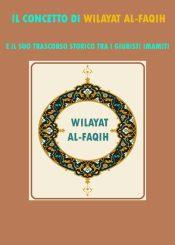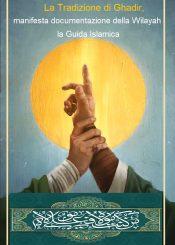Il Principe dei Credenti (intervista della Pravda a Shaykh Mostafa Milani Amin - versione inglese)
Il Principe dei Credenti (intervista della Pravda a Shaykh Mostafa Milani Amin - versione inglese)
Author :
Costantino Ceoldo
0 Vote
347 View
Fonte: http://english.pravda.ru/world/europe/19-10-2015/132352-prince_believers-0/ Trying to understand Islam means come closer to something completely different from Western culture to which we are so accustomed daily. The same applies if you really try to understand Buddhism or Taoism but unlike these two great Eastern religions, or great philosophies if you prefer, the Islamic religion has now become almost synonymous of intolerance and fanaticism. This is something wanted and certainly not by the most honest among the followers of the Prophet. Those responsible for this modern poisoning of consciences are the great colonial powers, stubborn in trying to revive a past that will never return. They work by creating artificial divisions among both Muslims and between them and the rest of the world. I believe that Islam is a great religion of peace, as all the highest and true religions. In trying to understand at least a little, I spoke recently with Shaykh Mostafa Milani, an eminent and respected Iranian theologian who lives and teaches in Qom, the holy city of Iran. We spoke about the one who, after the Prophet himself, is remembered in the history of Muslims: Imam Ali, Prince of Believers, cousin of the Prophet and by him referred to as his successor. 1) In the name of God, the Compassionate and the Merciful, thank you very much Shaykh Milani for being here with us to answer our questions.... A) You welcome, thank you for the trust and attention! Print version + - Font Size Send to friend 2) First, I would like if you tell us about Imam Ali. Only this question implies a huge response but can you at least outline the figure of this man? A) You should speak and write for days about this wonderful man and yet you could not describe him except in an insignificant part of what he deserves. He would have to succeed to the noble Prophet Muhammad (S) to guide humanity to the heights of virtue and spirituality but, alas!, he was denied what rightfully and that succeed to the Prophet. It was a right announced and reiterated several times by the Prophet himself, especially on the Day of Ghadir, returnig from the Farewell Pilgrimage, the last pilgrimage in the noble life of the Supreme Messenger of Allah. On that occasion thousands of pilgrims gathered themselves and the Prophet announced them Ali as his immediate successor as head of the Nation of Islam. Ali was really worthy to succeed to the Prophet as he was virtuous and devout, had a lion's heart and he was incredibly brave, but at the same time he was generous and kind, solicitous and indulgent. Legitimate and immediate vicar of the Prophet, his cousin, son and best friend, he was ready for any sacrifice to defend the life and the honor of the Prophet and Islam. He was wise and clever, brave and powerful, gentle and kind, in short, was a complete and sublime man. At the head of the Nation of Islam he would have led her to the heights of progress and of the material and spiritual perfection, or certainly one condition better than the one we see today unfortunately: steeped in ignorance, division and diversion. 3) Shiites and Sunnis are the two great families of Islam, born shortly after the death of the prophet Muhammad. What led to the schism which still exists today? A) The schism was caused by what happened before and after the death of the High Prophet. We Shiites, based on tests that we believe are clear and unambiguous, we show that the supreme Prophet Muhammad (S), several times during his life, pointed and appointed Ali ibn Abi Talib (peace be upon him), his cousin, son and more close companion, as his immediate successor. This can be demonstrated both through the Shia sources, of course, but also through the two major sources accepted almost unanimously by the Sunni world as key sources and reference: the Muslim and Bukhari. So much for the first of the death of the Prophet. 4) And after? A) Those who were present and witnessed the various occasions when the Supreme Prophet presented Ali as his immediate successor, expected Ali to succeed to the Prophet and became the Caliph, Imam and the temporal and spiritual guide of the Muslim world, therefore a leader state and a spiritual guide. Unfortunately this did not happen, because some other companions of the Prophet challenged to Ali his succession to the Prophet, despite they had already explicitly accepted him prior the Prophet's death. There are Sunni sources that narrate the event of Ghadir. The famous phrase that is always remembered: "Man Kuntu Mawlaa fa Haazhaa Aliyyun Mawlaa" is one of the phrases with which the Supreme Prophet recalled and ordered Muslims to follow Ali and designated him as his successor. It means: "He who has accepted me during my life as his Mawlaa then after me will have to accept Ali as his Mawlaa!". Here Mawlaa means lord, the one who decides the fate. This phrase is present in nearly all major Sunni sources. Most of our Sunni brothers translate Mawlaa as friend. But how can only mean friend? Perhaps the Prophet would stop all those Muslims, under the sun, in the desert, to say something already known and obvious to all?! Even if we stick to this sentence only, you understands that there is something deeper. In the Sermon of Farewell there are many other phrases that show that the Prophet wanted Ali as head of the Nation of Islam after him and not instead after twenty-three years. Some things unfortunately have not been told, but existed in Sunni sources, some may have even been censored, but I do not want to get into this controversy. These are the main doctrinal reasons about the schism that still exists today and yet many young Sunnis are discovering the truth: is the era of free flow of information and knowledge, and no one can hide anything from anyone! 5) Imam Ali was seriously wounded while praying inside a mosque and died days later but his movement continued to exist. It's correct? A) Yes, unfortunately he too was a victim of the takfiris terrorism, the Khawarij fanatics cutthroats who, blind in front of his unrivaled faith and virtue, considered him even as an apostate while supposedly considered themselves immune from every sin and failure. The same happens today: the spiritual children of the Khawarij and the abominable Salafi and Takfiris terrorists (ISIS, al-Qaedah, an-Nusrah, Boko Haram etc.) massacre the best Muslims, friends and followers of the Prophet and Ali and do it exactly how their deviant spiritual fathers: in mosques, in places of worship, in mausoleums... 6) In the Imam Ali coexisted different qualities not common in Western men. It was these qualities to establish his importance in Islam? A) Of course! His completeness and universality made him eternal in the hearts and memories, a model for all the human beings free and fair. But one quality of his made him especially loved and respected: his immense justice! 7) Why the battle of Karbala, so obvious in the final outcome against the Shiites, is also so important in Shiite and, more generally, in the Muslim history? A) Because it is a sublime and perfect model of sacrifice and struggle against the tyrants, for all mankind and in all ages. In this struggle there must be no excesses and defects, cruelty and inhumanity: it is a fair fight, wise, balanced, diligent and effective, not cruel, violent and unreasonable. If only Muslims would understand and appreciate it , today their lands would not be in the hands of their enemies and Palestine would not be occupied by murderous and illegitimate Zionist regime in Tel Aviv. Unfortunately, the majority of Muslims in the day of Ashura, instead of remembering Karbala, instead of remember this sublime and perfect model of struggle against evil and tyrants, celebrates and fast and this is the real problem and drama of the Islamic world! 8) What means to be "Shiite" today? A) It means, first of all, to be in the front line in the fight against injustice and terrorism, the rest is secondary: the fight against evil and injustice is indeed the backbone of Islam! Without it, you end up having a faith faded and spineless, or worse, become arid and bigots and inevitably fall into the abyss of fanaticism and terrorism. Obviously before you set foot in the field of battle against the outward enemies and tyrants, you should be already emerged victorious from the Supreme Battle, the inner enemies and tyrants: the passions and human instincts... 9) Let me conclude with a couple of questions that are not properly about the topic of the interview but that are interesting: what teaches the Noble Quran about the silence of God and the evil in the world? A) Allah does not allow the evil in the sense of order it or facilitate it or help the wicked and the guilty to commit it. He created a sublime creature, the human being, giving him free will and freedom of thought. He ordered him only and only the good, guiding him only and only to the virtue. Also, He gave him a freedom of choice that is not absolute and it would be absurd to accept this freedom given by Allah and at the same time claim that He prevent His creatures from every sin and evil, to expect that He blocks the way to anyone who wants to commit a sin! Allah guides only to the good and as long as His creatures want to follow the Way of Good, from Him guided and helped, but when they insist in evil and sin, He gives them some time, but then punishes them and remove from the face of land, as happened to many iniquitous peoples of the past. 10) Clearly, we know the evil manifest but not that mistaken for good or even that was prevented by the action of God and about which man knows nothing... A) The criterion is this: everything that comes from God is good, although it may seem bad and everything that comes from our rebellious passions is bad, although it may seem good. It still remains the problem of knowing what comes from God and what comes instead from our rebellious passions and this is duty of Religion, but of the true and authentic one, which comes from God and is therefore well, while those false and invented to deceive and exploit the masses, are evil, precisely because they come from low and vile instincts and. We really thank Sheykh Milani for his patience and kindness answering to our questions. COSTANTINO CEOLDO - PRAVDA
Related Titles

L'Esempio Perfetto - Sguardo alla condotta morale del Profeta dell'Islam (S)

La verità così com'è: La Shi’a Imamita Jafarita

L'Imam Occulto

Il concetto di Wilayat al-Faqih e il suo trascorso storico tra i giuristi Imamiti

Il Significato di Ashura

Breve Storia Dell’Imam Ridha’ (as)

La Tradizione di Ghadir, manifesta documentazione della Wilayah, la Guida Islamica